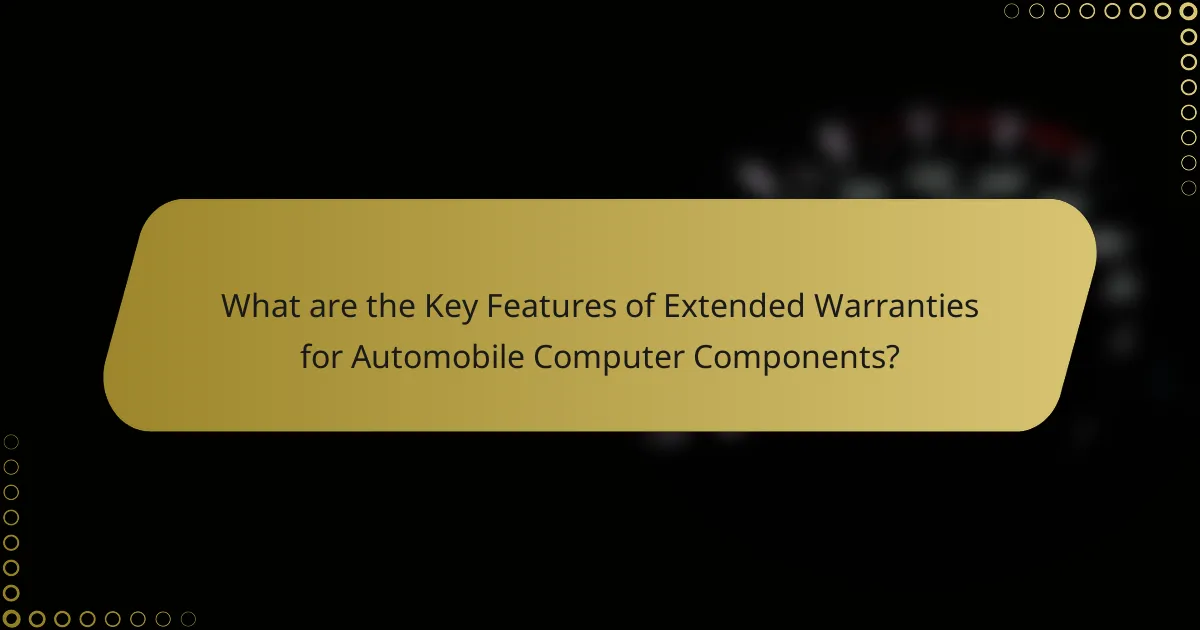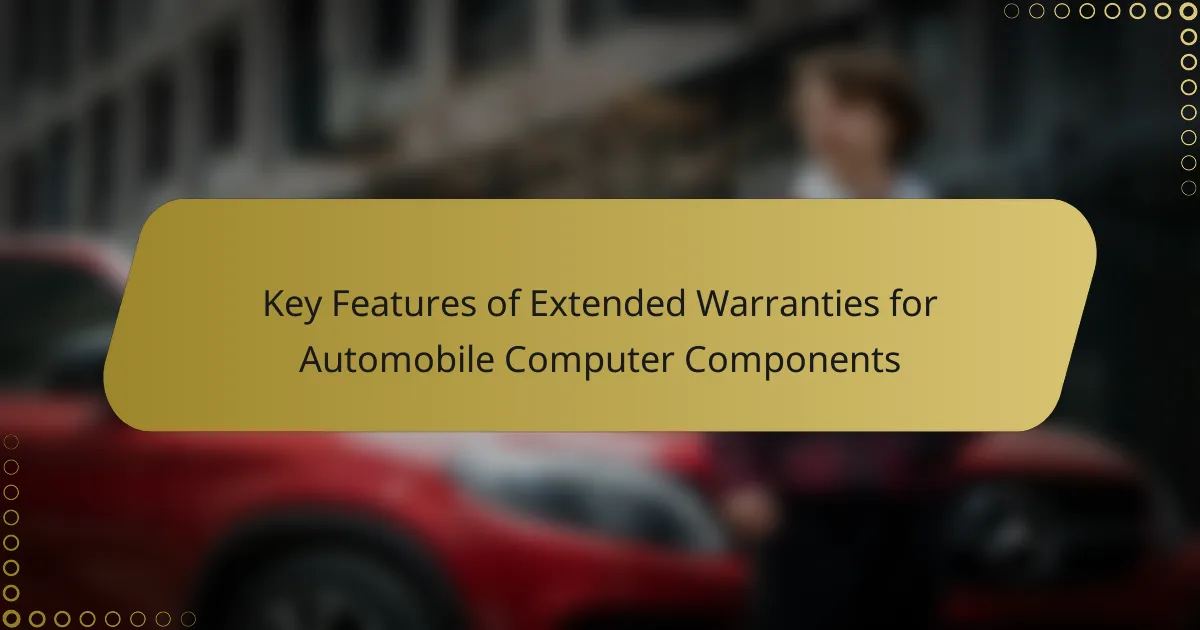Extended warranties for automobile computer components provide coverage for repairs and replacements related to electronic systems in vehicles. These warranties typically include benefits such as parts and labor coverage, roadside assistance for breakdowns, and transferability to new owners upon sale. Coverage duration varies, with options for several years or specific mileage limits, and many warranties require a deductible before activation. Overall, these features are designed to enhance consumer protection against unexpected repair costs associated with automobile electronic systems.

What are the Key Features of Extended Warranties for Automobile Computer Components?
Extended warranties for automobile computer components typically cover repairs and replacements for electronic systems. These warranties often include benefits such as parts and labor coverage, which ensures that both the faulty component and the service required to fix it are included. They may also offer roadside assistance, providing support in case of breakdowns related to electronic failures. Additionally, these warranties often feature transferability, allowing the warranty to be passed on to a new owner if the vehicle is sold. Coverage duration varies, with options for several years or specific mileage limits. Many warranties also offer a deductible, which is the amount the vehicle owner must pay out-of-pocket before coverage kicks in. Overall, these features enhance consumer protection against unexpected repair costs associated with automobile computer components.
How do Extended Warranties differ from standard warranties?
Extended warranties provide coverage beyond the standard warranty period. Standard warranties typically cover defects in materials and workmanship for a limited time. They are often included with the purchase of a product. Extended warranties can be purchased separately and offer additional protection. This protection may include coverage for accidental damage, wear and tear, and other issues not covered by standard warranties. The duration of extended warranties is usually longer than that of standard warranties. For example, a standard warranty may last one year, while an extended warranty can last several years. Extended warranties often come with additional fees, while standard warranties are included in the product price.
What specific coverage do Extended Warranties provide for automobile computer components?
Extended warranties for automobile computer components typically cover the repair or replacement of critical systems. These systems include the engine control unit, transmission control module, and anti-lock brake system. Coverage often extends to electrical components such as sensors, actuators, and wiring harnesses. Many plans also include diagnostics and labor costs associated with these repairs. Specific terms may vary by provider, so it is essential to review the warranty details. Some warranties may exclude certain wear-and-tear items or pre-existing conditions. Understanding the specific coverage helps in making informed decisions regarding vehicle maintenance and protection.
How does the duration of Extended Warranties impact their value?
The duration of extended warranties directly affects their value. Longer durations typically increase perceived value due to extended coverage. Consumers often associate longer warranties with greater reliability and product quality. A study by the Consumer Electronics Association found that products with warranties exceeding three years are viewed as more trustworthy. Conversely, shorter warranties may diminish perceived value and confidence in the product. Thus, duration plays a crucial role in consumer decision-making regarding extended warranties.
What are the benefits of having an Extended Warranty for automobile computer components?
An extended warranty for automobile computer components provides financial protection against unexpected repair costs. This warranty typically covers parts and labor for repairs beyond the manufacturer’s warranty period. It helps in managing repair expenses, especially for complex electronic systems in modern vehicles. The average cost of repairing electronic components can exceed $1,000, making an extended warranty a cost-effective option. Additionally, having an extended warranty can enhance resale value. Potential buyers often view vehicles with warranties as more reliable. Furthermore, extended warranties often offer peace of mind, reducing the stress associated with potential breakdowns. Overall, these benefits make extended warranties a valuable investment for automobile owners.
How can Extended Warranties save costs on repairs?
Extended warranties can save costs on repairs by covering unexpected expenses. They provide financial protection against costly repairs that may arise after the manufacturer’s warranty expires. For example, repair costs for automobile computer components can be significant, often reaching hundreds to thousands of dollars. Extended warranties typically offer a fixed service fee for repairs, reducing the financial burden on the vehicle owner. According to a study by the Automotive Warranty Association, nearly 60% of consumers reported saving money on repairs due to extended warranties. This financial safety net can lead to peace of mind for car owners, knowing they are protected from unforeseen repair costs.
What peace of mind do Extended Warranties offer to vehicle owners?
Extended warranties offer vehicle owners peace of mind by providing financial protection against unexpected repair costs. This assurance allows owners to budget more effectively, knowing that major expenses are covered. Extended warranties typically cover a range of components, including critical automobile computer systems. With these warranties, owners can avoid the stress of sudden breakdowns and their associated costs. Statistics show that unexpected vehicle repairs can average over $500 per incident. Having an extended warranty can significantly reduce the financial burden during such events. Additionally, many extended warranties include roadside assistance, enhancing the overall security of vehicle ownership. This comprehensive coverage helps owners feel more secure in their investment.
What factors should be considered when choosing an Extended Warranty?
When choosing an Extended Warranty, consider coverage details, duration, and exclusions. Coverage should include parts and labor for critical components. Duration affects how long the warranty remains valid, typically ranging from one to several years. Exclusions specify what is not covered, which can significantly impact your protection. Additionally, assess the reputation of the warranty provider. A reliable provider offers better support and service. Compare costs against potential repair expenses to determine value. Review transferability options if you plan to sell the vehicle. Finally, check customer reviews for insights on claims processes and satisfaction.
How does the reputation of the warranty provider affect the decision?
The reputation of the warranty provider significantly influences the decision-making process. A reputable provider is often associated with reliability and trustworthiness. Consumers tend to prefer providers with positive reviews and a history of fulfilling claims. Trust in the warranty provider can reduce perceived risk in purchasing extended warranties. Research indicates that 70% of consumers consider brand reputation before making warranty decisions. A strong reputation can lead to higher customer satisfaction and loyalty. Conversely, a poor reputation may deter potential buyers, leading them to seek alternatives.
What specific terms and conditions should be reviewed before purchasing?
Before purchasing an extended warranty for automobile computer components, review the coverage details. This includes what parts are included and what is excluded. Check for limitations on repair services and whether they require using specific providers. Examine the warranty duration and any mileage restrictions. Understand the claims process and any associated fees. Look for conditions regarding pre-existing issues and maintenance requirements. Verify if there are transferability options if the vehicle is sold. Finally, assess the cancellation policy and any potential refunds.
How do Extended Warranties for automobile computer components relate to overall vehicle maintenance?
Extended warranties for automobile computer components significantly enhance overall vehicle maintenance. They provide financial protection against costly repairs of electronic systems. Many modern vehicles rely heavily on computer components for performance and safety. If these components fail, repairs can be expensive, often exceeding several hundred dollars. Extended warranties cover these potential repair costs, allowing for better budgeting and peace of mind. Additionally, having an extended warranty encourages timely maintenance and repairs, as owners are more likely to address issues promptly. This proactive approach can extend the lifespan of the vehicle and improve its reliability. Overall, extended warranties serve as a valuable tool in managing the maintenance of vehicles equipped with advanced technology.
What are the common misconceptions about Extended Warranties?
Common misconceptions about extended warranties include the belief that they cover all repairs. In reality, extended warranties often have exclusions and limitations. Another misconception is that they are unnecessary if the manufacturer’s warranty is still valid. Many repairs can exceed the coverage provided by the original warranty. Some consumers think that all extended warranties are the same. In fact, coverage varies significantly between providers and plans. Additionally, many believe that extended warranties are a waste of money. Studies show that they can save consumers from high repair costs. Lastly, some assume that extended warranties are transferable. While some plans allow transfer, others do not, impacting resale value.
What are the most important tips for maximizing the value of an Extended Warranty?
To maximize the value of an extended warranty, understand the coverage details thoroughly. Review what components are included in the warranty. Ensure the warranty covers both parts and labor costs. Utilize the warranty for regular maintenance to prevent larger issues. Keep all service records to support claims. Compare costs of repairs against the warranty coverage. Contact the warranty provider for clarification on any uncertainties. Finally, be aware of the warranty expiration date to make timely claims.
Extended warranties for automobile computer components are designed to provide comprehensive coverage for repairs and replacements of electronic systems in vehicles. This article outlines key features of these warranties, including benefits such as parts and labor coverage, roadside assistance, and transferability. It also distinguishes extended warranties from standard warranties, details specific coverage for critical systems, and discusses the impact of warranty duration on perceived value. Additionally, the article addresses factors to consider when choosing a warranty, common misconceptions, and tips for maximizing its value, ultimately highlighting the financial protection and peace of mind these warranties offer to vehicle owners.
